 In a damning blow to the UK government’s love affair with identity cards, a British criminologist has warned that the new technology could actually increase, rather than solve, the problem of identity theft and fraud.
In a damning blow to the UK government’s love affair with identity cards, a British criminologist has warned that the new technology could actually increase, rather than solve, the problem of identity theft and fraud.
Dr Emily Finch, of the University of East Anglia in England said that identity cards and chip and pin technology for credit cards were unlikely to alleviate the problem, as fraudsters react with more creative responses.
Finch said that a growing dependence on technology was leading to a breakdown in individual vigilance, which remains the best protection against fraud and identity theft.
“There is a worrying assumption that advances in technology will provide the solution to identity theft whereas it is possible that they may actually aggravate the problem,” she told the British Association science conference.
As part of her research, Finch interviewed thieves, vagabonds, fraudsters and ne’er do wells and asked about the impact new technology may have on their nefarious activities.
Not surprisingly, she learned that fraudsters were tenacious blighters, who were ready and willing to change their methods to elude new security measures.
 “Studying the way that individuals disclose sensitive information would be far more valuable in preventing identity fraud than the evolution of technologically advanced but ultimately fallible measures to prevent misuse of personal information after it has been obtained,” she added.
“Studying the way that individuals disclose sensitive information would be far more valuable in preventing identity fraud than the evolution of technologically advanced but ultimately fallible measures to prevent misuse of personal information after it has been obtained,” she added.
As we reported last month, a survey by Gallup revealed that almost a fifth of US consumers admitted falling victim to identity theft, although Finch said that there were sometimes less dodgy reasons for fraud and identify theft – sometimes people just wanted to start again with a new identity.
Focusing on the UK government’s proposed ID card scheme for its citizens, Finch said that the cards could potentially increase fraudulent behaviour,
“What fraudsters know about is human nature,” said Finch. “And they adapt to things like the Internet which provides an absolutely fantastic base to access personal information.”
Despite ministers insisting that national identity cards would counter terrorism, crime and illegal immigration, critics like the civil rights group liberty say that the scheme won’t tackle identity fraud, crime or any of the high-profile problems the Government has claimed they will address.
Finch also expressed doubts about chip and pin technology (which enables consumers to purchase goods by punching in a personal number rather than using a signature), saying that criminals may switch from watching an individual punch in the code and stealing the card, and just nabbing credit card application forms and getting new cards and numbers instead.
 Warner Music Group has announced a new digital music distribution mechanism based on downloads rather than physical media like CDs.
Warner Music Group has announced a new digital music distribution mechanism based on downloads rather than physical media like CDs. With far lower production costs, Bronfman claimed that the e-label will give recording artists a “supportive, lower-risk environment” (I think this means “less cash from the record company”) without as much pressure for huge commercial hits – something that could benefit artists with a more “selective audience”.
With far lower production costs, Bronfman claimed that the e-label will give recording artists a “supportive, lower-risk environment” (I think this means “less cash from the record company”) without as much pressure for huge commercial hits – something that could benefit artists with a more “selective audience”. Bronfman called on the technology industry to work on digital rights management (DRM) standards, arguing that compulsory licensing – with support from P-to-P vendors – would set a price for downloaded music while forcing music companies to make their products available online to P-to-P users.
Bronfman called on the technology industry to work on digital rights management (DRM) standards, arguing that compulsory licensing – with support from P-to-P vendors – would set a price for downloaded music while forcing music companies to make their products available online to P-to-P users.
 The Bush administration doesn’t appear to have taken in to account any of this, and all of a sudden are interested in the views of the people. Wouldn’t it have been great if they’d listened to the view of the people before invading Iraq.
The Bush administration doesn’t appear to have taken in to account any of this, and all of a sudden are interested in the views of the people. Wouldn’t it have been great if they’d listened to the view of the people before invading Iraq. Apple may be forced to shell out royalties to Microsoft for every single iPod it sells after it emerged that Microsoft was first to file a crucial patent on technology used in its iPod.
Apple may be forced to shell out royalties to Microsoft for every single iPod it sells after it emerged that Microsoft was first to file a crucial patent on technology used in its iPod. The application doesn’t identify the iPod by name (usual for such petitions), describing a “portable, pocket-sized multimedia asset player” capable of managing MP3 music files including “a song title, a song artist, a song album, a song length”
The application doesn’t identify the iPod by name (usual for such petitions), describing a “portable, pocket-sized multimedia asset player” capable of managing MP3 music files including “a song title, a song artist, a song album, a song length” AOL is giving away hundreds of thousands of dollars of gold, cash and goods seized from a spammer as a warning to anyone thinking of “making a living sending spam to AOL members”.
AOL is giving away hundreds of thousands of dollars of gold, cash and goods seized from a spammer as a warning to anyone thinking of “making a living sending spam to AOL members”. The company said it managed to close down the dastardly spammer’s 40-computer enterprise thanks to help from its members, who enthusiastically clicked a “report spam button” to register their complaints.
The company said it managed to close down the dastardly spammer’s 40-computer enterprise thanks to help from its members, who enthusiastically clicked a “report spam button” to register their complaints. Thanks to its aggressive mo’fo’ antispam filters, AOL has claimed that spam on their servers has fallen by more than 85 percent since its peak in late 2003.
Thanks to its aggressive mo’fo’ antispam filters, AOL has claimed that spam on their servers has fallen by more than 85 percent since its peak in late 2003. Let’s start this week’s news with some nice, old-fashioned, technological paranoia: As a teenager, you start to realise that giving everyone your mobile number, letting people know where you live and freely handing out your email address can be a bad thing. Imagine my surprise then when I found out that the Australian government had
Let’s start this week’s news with some nice, old-fashioned, technological paranoia: As a teenager, you start to realise that giving everyone your mobile number, letting people know where you live and freely handing out your email address can be a bad thing. Imagine my surprise then when I found out that the Australian government had 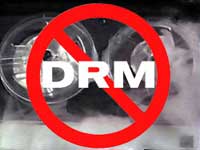 DRM on motherboards
DRM on motherboards In other news: After years of Apple thinking themselves obviously superior by having just the one mouse button, and after years of jokes about how Mac users are inferior because they can’t use more than the one button, Apple has gone back and decided to bring out a mouse with not one, not two, but three buttons, as well as a four way scroll wheel. They have called their mouse, quite simply,
In other news: After years of Apple thinking themselves obviously superior by having just the one mouse button, and after years of jokes about how Mac users are inferior because they can’t use more than the one button, Apple has gone back and decided to bring out a mouse with not one, not two, but three buttons, as well as a four way scroll wheel. They have called their mouse, quite simply,  Almost a fifth of US consumers have admitted falling victim to identity theft, with younger adults at greatest risk, according to new figures.
Almost a fifth of US consumers have admitted falling victim to identity theft, with younger adults at greatest risk, according to new figures. Experian-Gallup found that around two-thirds of consumers who have yet to experience identity theft felt that it was unlikely to happen to them, with only six per cent taking the precaution of purchasing some form of identity theft protection.
Experian-Gallup found that around two-thirds of consumers who have yet to experience identity theft felt that it was unlikely to happen to them, with only six per cent taking the precaution of purchasing some form of identity theft protection. Illegal music downloaders shell out more for legitimate music downloads than goody two-shoes music fans.
Illegal music downloaders shell out more for legitimate music downloads than goody two-shoes music fans.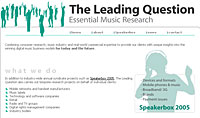 How much both groups spend on CDs wasn’t specified.
How much both groups spend on CDs wasn’t specified.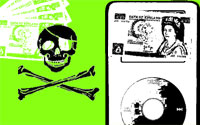 Respondents cited built-in cameras, organiser functions and video cameras above music players in their preferences for mobile phone features.
Respondents cited built-in cameras, organiser functions and video cameras above music players in their preferences for mobile phone features. Sony Whips Out A White PSP
Sony Whips Out A White PSP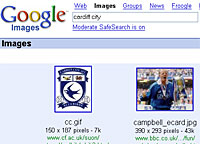 Google Grabs 47% Of All Searches Online
Google Grabs 47% Of All Searches Online A British court has fined a man £500 ($870, €720) for using a residential wireless broadband connection without permission.
A British court has fined a man £500 ($870, €720) for using a residential wireless broadband connection without permission.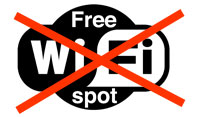 We have to say this seems a little harsh as there appears to be no evidence that there was any hostile motive behind his actions.
We have to say this seems a little harsh as there appears to be no evidence that there was any hostile motive behind his actions.